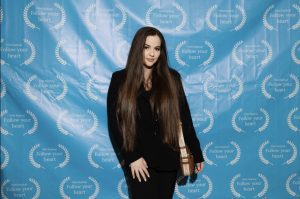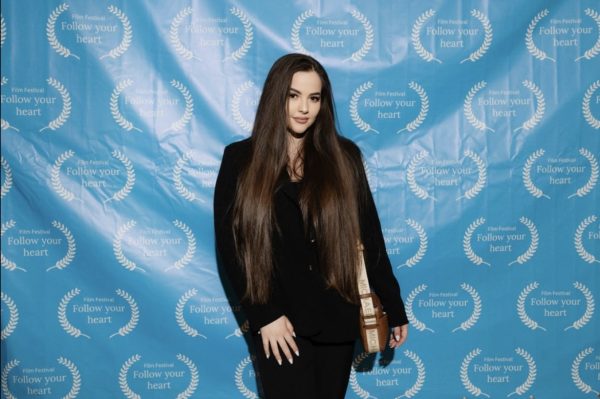
Karina Terentyeva: “Art is a Bridge Between Cultures and Eras”

Byline: Nia Bowers
According to the analytics service Magic App, music lovers in Kazakhstan use over 2,200 music applications. Kazakhstani performers are also actively adopting them. More than 500 Kazakhstani artists are featured in Yandex Music’s catalogs, with their tracks breaking into Apple Music’s top charts and Spotify’s daily updated Top 50 Kazakhstan playlists. The digital stage has become a new rallying point for musicians from Kazakhstan. But a modern artist is a multifaceted creator whose work extends far beyond the stage. Singers become filmmakers, performers become researchers, and international festival contestants become jury members and public intellectuals. We spoke with Karina Terentyeva — a vocalist, author of scholarly works, and jury member for international film festivals — about how to combine these roles and find synergy among them. Her career, which began over ten years ago, is a vivid example of the synthesis of art, science, and cultural diplomacy.
— Karina, you just returned from a film festival in New York where you served as a jury member. What was it like to experience art “from the other side”?
— It was an incredibly valuable and responsible experience. The Follow Your Heart Film Festival is a platform for bold artistic statements, and evaluating the work of colleagues is a challenging yet inspiring task. I was guided not only by personal taste but also by a professional understanding of artistic expression, the integrity of the concept, and, of course, that very “bridge” that art builds between people. My background in socio-cultural activities and my experience on film sets helped me analyze the works more deeply, seeing not only the result but also the process. This teaches immense empathy and broadens one’s perspective.
— Let’s go back a few years. Your victory at the World Art Festival in Skopje in 2024 was a major breakthrough. How did that journey begin for you, and how did you achieve the silver result?
— W.A.F. was a conscious challenge I set for myself. It took me a long time to decide to participate. The most difficult part, as is often the case, was choosing the material. “I Will Always Love You” is not just a song; it’s an entire universe created by Whitney Houston. It wasn’t enough to sing it technically well — I had to live it, to find something of my own in the story so that there wasn’t a hint of falsehood. The preparation was intense: working with a vocal coach, searching for the right emotional state, rehearsing. When you step onto the stage and see renowned artists and masters of the European scene on the jury, your heart sinks. But in that moment, you realize you’re not just a participant — you are a representative of your culture. That sense of responsibility and pride gives you strength. Second place wasn’t just an award; it was confirmation that our Kazakhstani performance can be heard and highly appreciated on the international stage.
— You mentioned scholarly work. You are the author of publications in the field of culture. How does academic knowledge influence your performance art?
— Absolutely directly. My bachelor’s degree from St. Petersburg University of Humanities and Social Sciences focused on socio-cultural activities — that is, how art functions in society, how it influences people, and shapes the cultural code. When I prepare for a performance, whether it’s a wedding or an international competition like the one in Skopje, I think not only about technique. I think about the meaning, the cultural context of the piece, what emotion and idea I want to convey to a specific audience. This transforms a performance from mere execution into a full-fledged act of communication.
— Your portfolio is unique: from a classical opera ball in Almaty to pop hits at international competitions and film extras work. What’s the secret to such creative flexibility?
— For me, there are no boundaries between “high” and “low” art. There is only sincerity and professionalism. Singing at the Almaty Opera Ball with an orchestra is about discipline and respect for tradition. Performing Whitney Houston at the World Art Festival is an emotional outpouring and engagement with contemporary culture. And participating in film shoots, even as an extra, is invaluable experience in teamwork and understanding how narratives are created. My duo “AIARU” was also a wonderful experiment in collaboration. Every genre and every project enriches you as an artist with new colors.
— You are an active member of professional associations and a participant in international art competitions. How important is it for a modern artist to be part of a professional community?
— It’s critically important. Art is born in dialogue. Professional associations and competitions, like those by the Art US Nation Association, are not just lines on a resume. They are the nervous system of the entire industry. This is where experience is exchanged, collaborations are born, and you always stay updated on trends. Most importantly, you feel support and a sense of belonging to a world that understands you without words. This is the very environment that prevents stagnation, constantly motivating you to move forward, try new things, and establish yourself — even as an expert capable of evaluating the work of others.